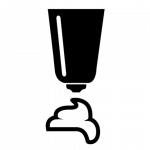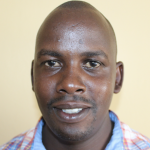The Shaviringa Community consists of 105 people. Every single person struggles to safely and easily access clean water. Their spring is unprotected and on an incredibly steep slope that they must trek up and down while carrying jerricans, which typically weigh forty pounds when full. During the rainy season traversing the slope to the spring is treacherous.

"The situation of the water point has always made me hesitant when sent to go and fetch water at the spring. One [reason] is stepping in [the] water while fetching water, and the other thing is how to negotiate [the] steep slope with water when it is so slippery," said 14-year-old Marion A., shown below.

The spring that supplies water to this community isn't protected; not only do they have a dangerous slope to the waterpoint, the water they collect is equally as hazardous to their health. Fear surrounding a basic need such as water makes life for Marion and her fellow community members merciless.

72-year-old Farmer Michael Injira (shown below) shared how the unstable water source affects him. "Last month, I had recurrent headache[s] on one side of my head. Going to seek treatment, I was diagnosed with typhoid, which cost me a lot of money; after diagnosis and prescription of medicines, I [had] to go to town to purchase those drugs."

Providing a clean, accessible water source for the Shaviringa Community will not only help them safely collect water, but it can be used without fear of illness. Time and resources once wasted on unclean water can be used instead to improve their lives. Something as simple as stairs to the spring will change the community members' lives.
When a spring is protected, the community members also receive training on proper healthy hygiene practices because access to clean water can only truly improve people's lives if behaviors change accordingly.
The protection of the spring will enable people like Marion to meet their basic water needs without fear and dream of a better future for themselves. And Michael will be able to drink and use clean water so he can keep his much-needed funds to provide for his family instead of using them to treat water-related illnesses. With clean water access, Shaviringa Community can focus its resources and energy on improving their lives.
The Proposed Solution, Determined Together...
At The Water Project, everyone has a part in conversations and solutions. We operate in transparency, believing it benefits everyone. We expect reliability from one another as well as our water solutions. Everyone involved makes this possible through hard work and dedication.
In a joint discovery process, community members determine their most advantageous water solution alongside our technical experts. Read more specifics about this solution on the What We're Building tab of this project page. Then, community members lend their support by collecting needed construction materials (sometimes for months ahead of time!), providing labor alongside our artisans, sheltering and feeding the builders, and supplying additional resources.
Water Access for Everyone
This water project is one piece in a large puzzle. In Kenya, Sierra Leone, and Uganda, we're working toward complete coverage of reliable, maintained water sources that guarantee public access now and in the future within a 30-minute round trip for each community, household, school, and health center. One day, we hope to report that this has been achieved!
Training on Health, Hygiene & More
With the community's input, we've identified topics where training will increase positive health outcomes at personal, household, and community levels. We'll coordinate with them to find the best training date. Some examples of what we train communities on are:
- Improved hygiene, health, andsanitation habits
- Safe water handling, storage & treatment
- Disease prevention and proper handwashing
- Income-generation
- Community leadership, governance, & election of a water committee
- Operation and maintenance of the water point
Chlorine Dispensers
Installing chlorine dispensers is an important piece of our spring protection projects. Protecting a spring provides community members with an improved water source, but it doesn’t prevent contamination once the water is collected and stored. For example, if the water is clean and the container is dirty, the water will become contaminated.
We ensure that each chlorine dispenser is filled with diluted chlorine on a consistent schedule so that people can add pre-measured drops to each container of water they collect. That way, community members can feel even more confident in the quality of their water.

 Protected Spring
Protected Spring
 Rehabilitation Project
Rehabilitation Project
















